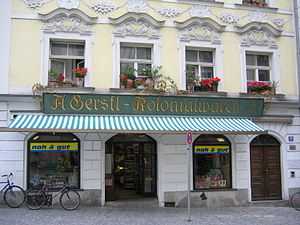Colonial goods
‘’’Colonial goods’’’ (Kolonialwaren) was a term used in the first instance by retailers, wholesalers and economists/statisticians during the nineteenth century and the first half of the twentieth century. The term was widely used in Germany and in export oriented countries that traded with Germany, notably Switzerland, Belgium and Luxembourg. It referred to food and other widely traded commodity items with good storage properties that were consumed in Europe but for the most part produced in other continents, notably sugar, rice, coffee, tea, cocoa and tobacco. These goods tended to be sold in specialist “colonial goods” shops, which were regarded as a distinctive sector.[1][2]
At a time when food and agriculture represented a relatively large proportion of overall economic activity, economic statistics often divided traded goods between “Colonial goods”, “Domestic (agricultural & extractive sectors) production” and “Manufactured (secondary sector) production”. The term ‘’’Colonial goods’’’ became less appropriate with the collapse of the western European empires that followed the Second World War. It nevertheless still appeared in books and articles in the 1970s, by now covering not merely agricultural output from (formerly) colonial countries but all long-life staple foods, regardless of provenance, as well as soap, washing powder and petrol/gasoline, and other newly important basic household supplies.[3]
By the end of the twentieth century the term had largely fallen out of use, while the items in which Colonial Goods retailers had specialised had long since been included in the wider range of goods offered by general purpose supermarkets. Where colonial goods shops survived they were regarded as old fashioned, and tended to be known in Germany and Switzerland as Aunt Emma Shops. In Austria the etymologically convoluted term Greißler is used. In Germany the earlier term is still used in Bremen by the William Holtorf Colonial Goods Shop, founded in 1874, which is claimed to be Germany’s last Colonial goods shop.[4]
The term “Colonial goods” is frequently encountered by those who study nineteenth and twentieth century texts, especially in the German language, and it is still incorporated into the long-form name of Germany’s largest (in 2014) supermarket group, Edeka (Einkaufsgenossenschaft der Kolonialwarenhändler im Halleschen Torbezirk zu Berlin).
References
- ↑ i.A. Hersteller: Julius Meinl, Vienna. "Kolonialwaren (Kaffee, Tee, Kakao), 1. Hälfte 20. Jh.". Technischen Museum Wien. Retrieved 1 January 2015.
- ↑ "Aroma vom Paradies: Pfeffer als Statussymbol, Kaffee als Wachmacher zum Kapitalismus, Hasch mit "postindustrieller" Zukunft -- ein neues Buch bietet Fakten und Thesen zur Geschichte der Genußmittel.". Der Spiegel (online). 7 April 1980. Retrieved 1 January 2015.
- ↑ "EUROPAS BROT-UND-BUTTER-PLAN SPIEGEL-Gespräch mit dem Vizepräsidenten der EWG-Kommission, Dr. h. c. Mansholt". Der Spiegel (online). 1 June 1960. Retrieved 1 January 2015.
- ↑ Jürgen Hinrichs (1 June 2013). "Kolonialwarenladen gerettet .... Bremen. Er gilt als einziger Kolonialwarenladen, den es in Deutschland noch gibt. "Wilh. Holtorf. Lebensmittel seit 1874" steht am Eingang des Geschäfts am Ostertorsteinweg. Als der Laden samt Haus zum Verkauf stand und sich lange Zeit niemand fand, musste befürchtet werden, dass es mit Holtorf vorbei ist. Jetzt gibt es aber einen Käufer, der das Geschäft weiter betreiben will. Eine Tradition ist gerettet.". Weser-Kurier, Bremen. Retrieved 1 January 2015.
